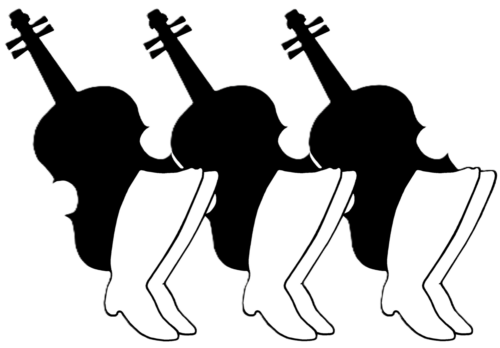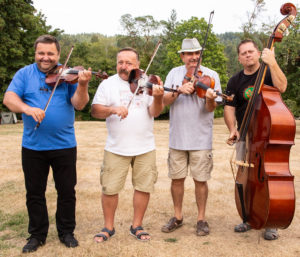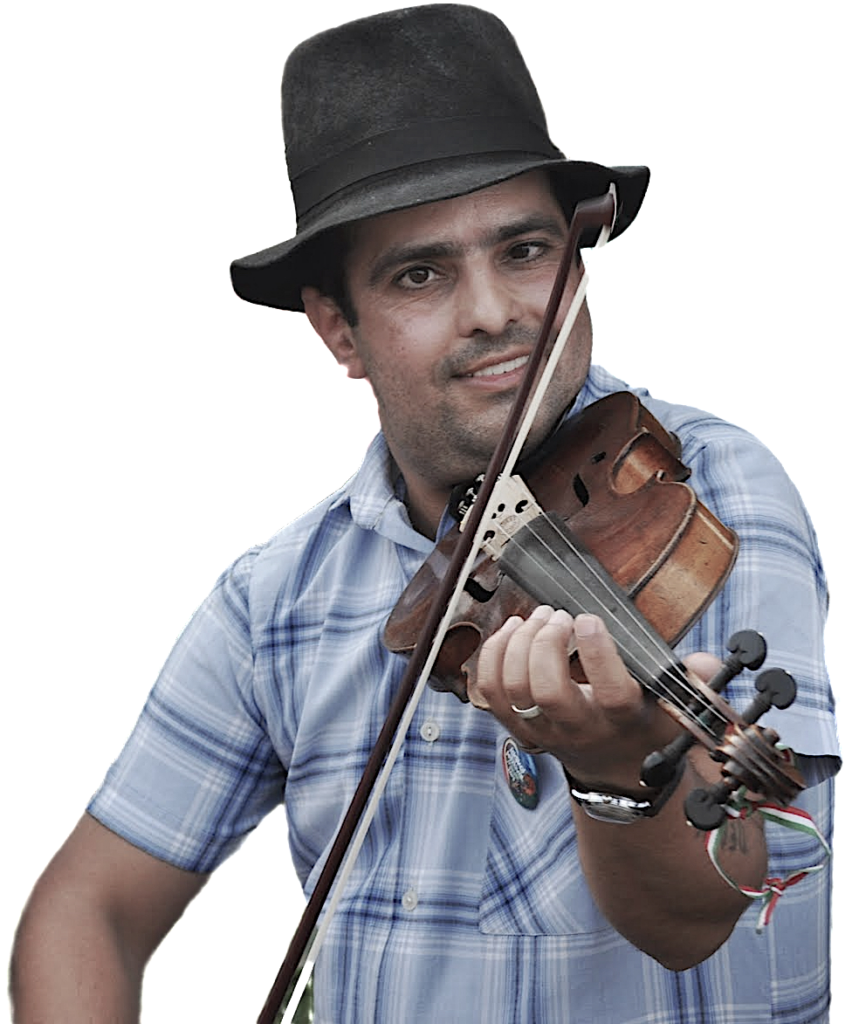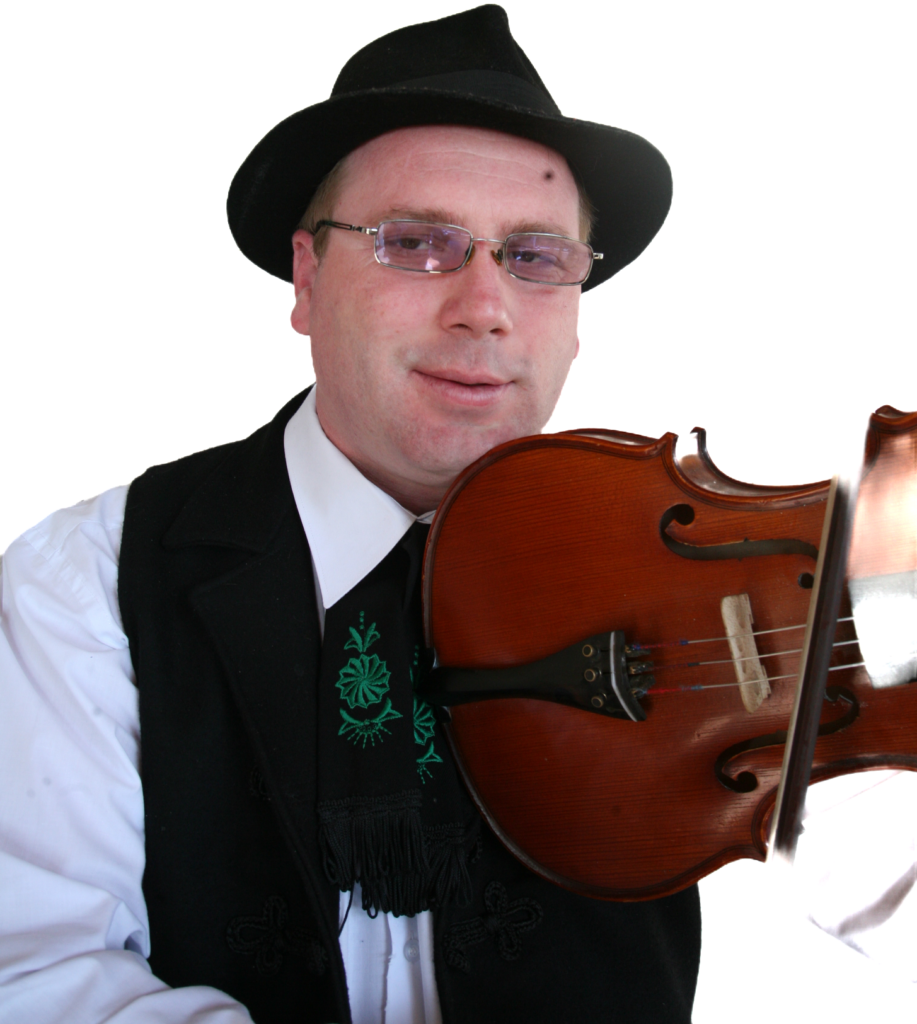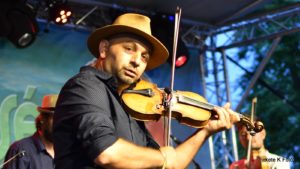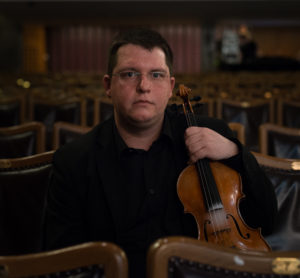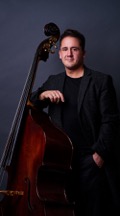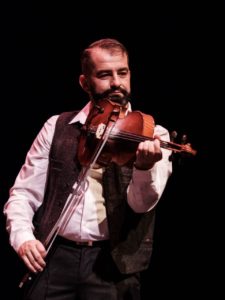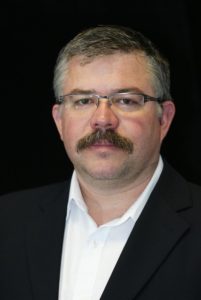Click triangle for more details.
Dűvő Zenekar
Dűvő has taught music at folk camps throughout Europe and are a favorite at folk festivals in Hungary. They play a vast repertoire from all ethnic groups of the Carpathian basin and Felvidék area, have earned the “Young Master of Folk Arts” in 1983, are the accompanying band for the Nógrád Dance Ensemble, and have played for many recent Western Canadian Hungarian Festivals. Dűvő has released at least 12 major recordings as well as numerous teaching recordings.
The members of Dűvő:
Albert Mohácsy plays bass, koboz, and ütögardon
Dénes Hrúz plays violin, duda and ütögardon
Szabolcs Hrúz plays violin, kontra and koboz.
Zsolt Nagy plays clarinet, kontra and furulya.
István “Kiscsipás” Varga
István “Kiscsipás” Varga was born on the 10th of January 1974 in Bánffyhunyad, Transylvania. He was born into the famous Csipás musical dynasty. His grandfather was the famous violinist Ferencz Varga, the “Old Csipás” who had three sons. The younger Ferencz Varga – “Csipás” – was also a famous violinist. The second son was István’s father, Márton “Csipás” Varga who was a famous primás of Kalotaszeg. The younger brother, József Varga, was a kontra and accordion player.
István started playing the violin at 12 years old. His father taught him and he played his first wedding at the age of 14. From there he continued to learn the violin and travel to play in many parts of the world—America, Japan, Canada, Latvia, and other parts of Europe. When he’s not busy playing violin, István enjoys fishing. He is excited to bring the fame of Kalotaszeg and the name of Csipás to the wider world – including Ti Ti Tábor.
Rudolf “Rudi” Toni
Rudolf “Rudi” Toni is the youngest member of three generations of a famous Kontra player dynasty from Kalotaszeg, Transylvania.
Kalotaszeg has a strong tradition of music, it is part of everyday life and is famous for its beautiful melodies and folklore dancing.
Rudi started playing music from an early age, starting with the guitar and very soon moving on to the Kontra, following in his fathers footsteps. Family and tradition are very important to him.
Rudi has toured around Europe with Fodor Sandor ‘Neti’, the Csuros, the Mera Gipsy Band and the Nadar Gipsy band for over 15 years. He is an all-rounder, playing kontra, bass and guitar and is happiest when performing the music of his ancestors on stage.
András Lelkes
András was born to revival. His father organized the first dance-house in 1972, some forty years ago, which has become the starting point of a whole movement. Since 1994 he has been a member of Tükrös ensemble. He founded a record label, and still runs a music production company producing shows and festivals, and providing training and courses to the whole ecosystem of the music industry. Recently he acquired a Master Degree in World Music Studies in the University of Sheffield, UK. His thesis is titled Authenticity and institutionalisation. Double-bass playing in the institutionalisation process of Hungarian dance house music. András continuously release music notations from authentic double bass players from the Carpathian basin – available on Scribd:
Bőgőzés a Kárpát-medencei népzenében – Gyakorlati szempontok táncházzenészek számára (also available on Scribd)
Molnár Lajos és zenekara, Alsókálosa – Rimaszombat (Gömör)
Potta Géza és zenekara: Abaúj (magyarbődi énekesekkel)
Varga Ferenc ‘Csipás és zenekara: Kispetri (Kalotaszeg)
Ádámosi Banda: Sövényfalvi lakodalom (Küküllő mente)
Csiszár Aladár és zenekara – Magyarpéterlaka (Maros mente)
Sanyi “Cilika” Csányi and Adrián “Alin” Mezei
Sanyi “Cilika” Csányi and Adrián “Alin” Mezei from the Szászcsávás band taught in 2022. Szászcsávás is a small village located in the Kis-Küküllő River valley of Transylvania, in Romania. For many generations the musicians from Szászcsávás village have been famous throughout the region.
In addition to their main instruments, Sanyi playing violin and Alin playing knotra, most of the musicians also play the other instruments well and are usually outstanding dancers.
Martin “Florin” Codoba
Martin “Florin” Codoba is a well-known village musician from Magyarpalatka. He has been learning and playing folk music with his family since 1985. Upon the death of his father in 2003 he took over leadership of the Palatka band.
He has held a permanent position at the Kallós Zoltán Alapítvány’s school of instrumental music since Fall 2015, where he serves as an informant and principal instructor. He has been a supporting member and instructor of the Kallós Zoltán Alapítvány for 28 years, teaching its folk music camps. For the past three years his two children have participated with him, accompanying on fiddle and kontra.
Florin has participated in many camps, festivals, and folk music concerts with such famous bands as Muzsikás, Dűvő, Üsztürü, Tükrös, Jánosi. He also worked for the Budai Zeneiskola imparting his knowledge acquired over many years.
Florin’s travels as a musician include trips to Hungary, Holland, Belgium, Germany, Italy, France, Finland, Poland, Estonia, and Latvia. In 2004 he toured in Australia, and in 2013 traveled to the U.S. for the first time. He currently performs solo and with his band, Erdőfű, throughout Transylvania and Hungary.
Bazseva
The authentic translation of playing music is bazseval, hence the name of the band. This group of young musicians formed a band with the mission to show the audience that Hungarian folk music can’t be forgotten and will never be on the dusty shelves.
The members of the band are currently active in the Budapest’s music scene with the responsibility to maintain and share the Hungarian folklore heritage while maintaining their youthful modern appearance.
Tamás Nyitrai
Tamás Nyitrai was born in Budapest in 1987. He became connected with Hungarian music when he was six years old at a family camp. Because of that experience, he became a pupil at the Erna Czövek Music School (Czövek Erna Zeneiskola) in Budakeszi. After he graduated, he enrolled in the Nyíregyház College in the discipline of singing and music as well as folk music. In 2007, he became a student in the newly established Department of Folk Music at the Franz Liszt Academy of Music (Liszt Ferenc Zeneművészeti Egyetem). There he received a diploma in performance and teaching. After receiving his diploma, he taught at several schools. At present, he is a member of band of the Hungarian State Folk Ensemble (Magyar Állami Népi Együttes). In addition to the Baszeva Band, he is a member or a participant in various configurations, participating in the work of dance ensembles, organizing and administering camps in Hungary and beyond. In 2011, he was recognized with Junior Príma status and, in 2012, he received the distinction of Young Master of Folk Arts (Népművészeti Ifjú Mestere). He views it important to interpret and to promote Hungarian folk music authentically.
András Bognár
András Bognár was born in 1983. He began to study music at the age of 4 under the mentorship of Pál Havasreti, first, in the framework of the Téka camps, later, as a student at the Óbuda Folk Music School (Óbudai Népzeneiskola). Already as a child, he felt a calling as a musician and as a faithful interpreter of folk music. In providing accompaniment to dance ensembles, he participated in numerous festivals in Hungary and beyond. He was a founding member of the Berkó Ensemble, afterward, from 2006, for seven years, a principal musician with the National Dance Ensemble (Nemzeti Táncegyüttes) and later with the Young Hearts Dance Theater of Felvidék (Ifjú Szívek Táncszsínház). In 2013 he was accepted at the Franz Liszt Academy of Music (Liszt Ferenc Zeneművészeti Egyetem) where he received my diploma in folk bass in 2016. He has been a member of numerous bands that played authentic folk music and world music. Between 2009 and 2015, he was recognized with Junior Príma status in the Tárkány Művek Band; from 2013 onward, he has been a member of the Bazseva Band, playing authentic Hungarian folk music; from 2015 onward, he has been a member of the Dresch String Quartet (Dresch Vonós Kvartett), of Esszencia and the Szeret Band led by Balázs Vizeli. He has participated in the making of many sound recordings and large productions.
Levente Garda, who hails from Marosvasarhely, Romania, one of the largest cities in Transylvania, is the son of a musician who used to play music for weddings in the villages surrounding that city. Since moving to Montreal during his teenage years, Levente has quickly risen to become one of the finest players in North America of the highly specialized and unique three-string and four-string viola instruments from Transylvania, also known as the “kontra.” He has studied with notable kontra experts, including Peter Arendas, Gergely Toth, and Szabolcs Hruz.
László (Laci) Orbán
Originally from Sófalva in Transylvania, “Laci” grew up immersed in the living folk culture of Székelyföld. He is an expert fiddler who has accompanied dozens of dance ensembles including the Hungarian State Folk Ensemble(Magyar Állami Népi Együttes) as well as performed concerts the world over establishing himself as a diverse and talented musician. He resides in the Seattle area and now splits his time between the US and Transylvania teaching violin.
Attila Csávás
I was born in Budapest on March 18, 1966. I graduated from the Béla Bartók Music High School and from the Ferenc Liszt University of Pedagogy as a teacher of classical clarinet and solfeggio in 1997.
I’ve worked with Hungarian folk music since the end of the 1990s. I have served as wind instrument player, first with the Csepel Dance Ensemble, then with the Duna Ensemble, and, from 2001, with the Honvéd Ensemble. For the past eight years, I have been teaching classes in folk clarinet and tárogató at the Ferenc Liszt Academy of Music. In 2015, I received my diploma from this academy.
My instruments
Clarinet, tárogató, alto saxophone, bagpipe, flutes. I also play kontra and fiddle.
At camp, I’d like to teach the music of the most characteristic dance dialects from the Carpathian Basin on wind instruments. On clarinet, the music of Hungary proper and perhaps Romanian music from Elek. On tárogató, the music of Hungary proper and Slovakia as well as Romanian Bánát music and/or songs from Őrkő. I have also taught music from Vajdaszentivány on the tárogató as a curiosity. On the saxophone, music from Kalotaszeg and Moldva. On flute, primarily from Moldva, perhaps also from Gyimes. I’d also be happy to teach bagpipe.
